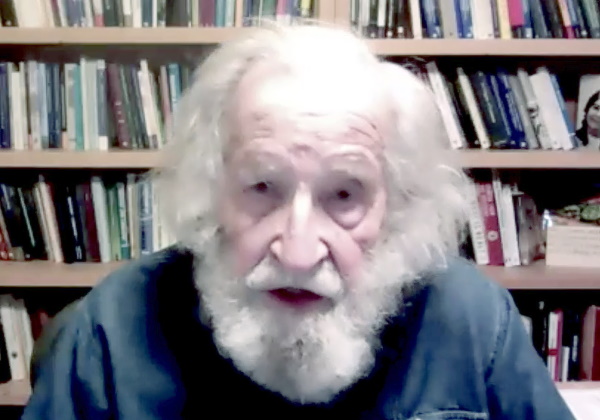
In this video, Noam Chomsky on Jung, Wittgenstein, and Gödel (Ask Me Anything), Chomsky receives a question where he either completely misses the point of the question, or is simply not informed on Daniel Dennett's idea that memes evolve in a manner which is similar to the way genes evolve (one example from his larger premise that the theory of evolution can be applied everywhere in science). Either way, Chomsky doesn't answer the question. I think it would be wonderful for him to have answered it, because his perspectives on other questions in this interview are lucid and erudite. It would be good to know what he thinks in this area, where Dennett has carved out a Chomsky-shaped hole, just asking for it to be filled. It's a perfect question for the great linguist to answer.
However, what happens in the Q&A exchange is a complete non-answer to the question.
The question is about the evolution of memes, and Chomsky quickly says evolution only pertains to genes. He keeps reiterating the point that languages change but do not evolve, because evolution in language stopped about 200,000 years ago, and has remained the same since then. He talks about how change in language is different from evolution of the ability to speak language. But this is all beside the point, if you understand the question from Joseph Velikovsky of Newcastle.
In the last paragraph of the non-answer below, he indicates that, on some level, he understood the question, by saying "Now it might be that some of the phenomena in change have a sort of an analogy to things that happen in evolution. But that's just an analogy. It's a totally different process. The evolutionary change involves genetic change."
 It could be that the question was not framed as well as it could have been. But I think it's just a matter of not being aware of Daniel Dennett's book where he talks about this, and the larger discussion that others having in this area. If anyone out there reading this can re-frame the question in a way so that Chomsky can grok the idea of memetic evolution -- not as an analogy -- but as something operating by some of the same principles, I think Chomsky's answer will be enlightening, and worth the effort.
It could be that the question was not framed as well as it could have been. But I think it's just a matter of not being aware of Daniel Dennett's book where he talks about this, and the larger discussion that others having in this area. If anyone out there reading this can re-frame the question in a way so that Chomsky can grok the idea of memetic evolution -- not as an analogy -- but as something operating by some of the same principles, I think Chomsky's answer will be enlightening, and worth the effort.
Q&A excerpt from the video
Q: Professor Chomsky, the following question comes from Joseph Velikovsky of Newcastle. So, there have been some developments in evolutionary biology in the field of memetics, which are different units of culture - behaviors that we pass down from one generation to the next. They evolve. They follow evolutionary algorithms. It was popularized by Dawkins. Now when we look at memetics, there is a philosopher Daniel Dennett who posits that for understanding language -- or in the quest to understand language -- you can use memetics to understand certain linguistic algorithms. That is to say that language evolves in the same way that biological cultures evolve, gene cultures evolve. I was curious if you've heard of the field of memetics, and if you had any opinions on that field.
Chomsky: Well, this proposal that you mentioned has a number of problems. One problem is that it doesn't give an explanation for anything. Try to give an example. Take the example that was just given. Does it say anything about wanna-contraction? No. Does it say anything about anything else about language? No. That's one problem. The other problem is that we have some evidence about evolution of language, and it doesn't seem to work anything like that. We don’t have a lot of evidence, but we have some... could run through it.
Q: Just to give a counterpoint, or an example, to defend memetics for a bit, take for example the phenomena we notice when we have expats living in a colony, and the development of their language, versus the development of language in a meme. So, I'll give a very concrete example. Take the English, and then the American colonists. The American colonists spoke Rhotic English and over time the mainland population of English, the English that we know the people in Britain speak, it evolved into the Queen's English, while the colony population has sort of maintained Rhotic English. We notice a similar type of phenomena with the French and the Quebecers, the Chinese and the Strait Chinese of Singapore. Well, a very similar thing happens in biology in population dynamics. In fact, if you have a population, a mainland population, and you take out different individuals from that mainland population and you put them on an island, the mainland population will evolve at a faster rate than the island population. And they’ll sort of be, not stuck out of time... they don't totally stop evolving, in either biology or linguistics, but it's an example of an evolutionary algorithm that seems to hold with linguistics.
Chomsky: Except that has nothing to do with evolution. We have to distinguish evolution from change. Languages change all the time, but there's no linguistic evolution. Evolution means something that's happening basically to your genetics, to your DNA. That's evolution. And there's pretty good evidence that there has been no evolution of the language faculty for a couple hundred thousand years. This is a common misunderstanding, but change is not evolution. The American colonists and the British who stayed in the mainland had the same language faculty; it hadn't changed. if you had taken an American colonist child and raised him in London, he’d speak exactly like the people in London, and conversely. In fact, if you take an American kid today as an infant and you raise him in a tribe in the Amazon, he'll speak their language perfectly. The reason is, as far as we know, there has been no evolution of the language faculty ever since language emerged. And for that there's fairly good evidence. We know from genomic evidence that humans began to separate roughly 150,000 years ago (at least that much, maybe earlier, but that's the earliest that’s been traced.) When you take the people who separated, basically the Khoisan people in Africa, they have the same language faculty that we do as far as anyone knows. There's just no evidence for that effect. What I said about raising an American infant in the Amazon, as far as we know that's true quite generally, so there's literally no evidence that the language faculty has evolved at all since language first emerged. Which is not very surprising. These are very short periods of evolutionary time. 200,000 years in evolution is an instant.
Q: I think we're confusing the tree with its fruits. That is to say the mechanisms of evolution - genetics - haven't necessarily (well they have changed as well, just as the language faculty over time has changed at one point, but we were well at one point over a grand scale and descendants from amphibians, when we evolved at some point to have language. So, the language faculty if it is intrinsic to us would have had to evolve at some point). But my point is that for both cases, the island population and the mainland population, the mechanism of evolution, i.e., genetics, is the same. The linguistic evolution, i.e., the linguistic faculty for the Americans and the Bostonians and the English was the same. But the software has changed, has evolved, in both cases.
Chomsky: That’s just like saying that my language is different from your language. Which it is. I speak differently than you do. But we have the same language faculty. It's a serious mistake to confuse evolution with change. Now it might be that some of the phenomena in change have a sort of an analogy to things that happen in evolution. But that's just an analogy. It's a totally different process. The evolutionary change involves genetic change. A change in the way people behave -- for all kinds of reasons that changes. So, in fact we can talk about language evolution, and there is work on that, but these other things are just the study of language change which may have some loose analogy to things that happened within evolution.